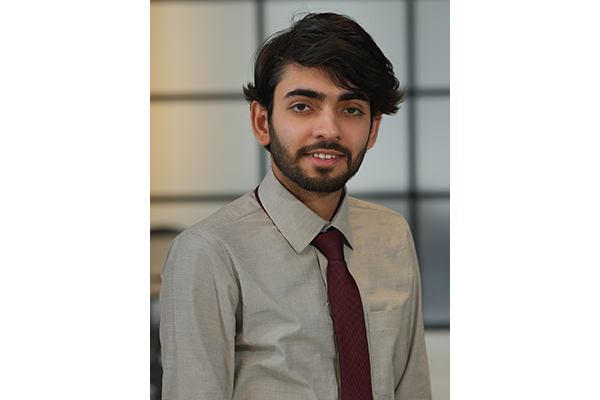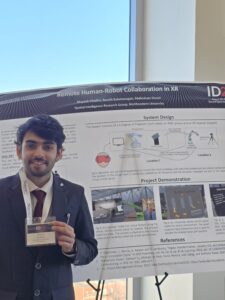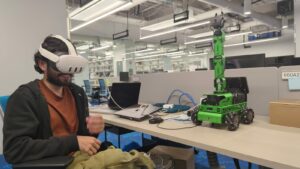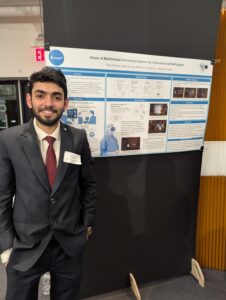Advancing Technology Through Creative Solutions

Mayank Chadha, MS’25, cyber-physical systems, has always had a strong fascination with robotics and technology. He wanted to gain more experience building cyber-physical systems and a chance to work on impactful research projects that developed creative solutions for difficult problems. The cyber-physical systems master’s program was the perfect opportunity for him to learn and engage in a subject he is passionate about.
Mayank Chadha, after completing his bachelor’s degree in mechatronics, robotics, and automation engineering, worked at a research institute focused on gaming technologies and IoT. Chadha always had a strong interest in robotics and integrating multiple devices; and, through his exploration, his interest and curiosity only grew stronger. He was fascinated with building cyber-physical systems and chose to pursue a master’s degree to build upon his fascination and gain more experience with these technologies. Northeastern University is one of the few universities that has a master’s program in cyber-physical systems. The highly specific, curated courses and career advancing co-op program are what solidified Chadha’s decision to pursue an engineering master’s degree from Northeastern.
At Northeastern, Chadha has been engaged in extensive research opportunities that further expand his knowledge of cyber-physical systems. He has participated in a research co-op in the Spatial Intelligence Research Group and has worked as a teaching assistant. Both experiences have advanced Chadha’s leadership skills and have prepared him for a bright future with plenty of career options.
In the Classroom
When Chadha first joined his master’s program, he was offered a teaching assistant (TA) position for the course “Building Digital Twins” with Adjunct Faculty Andrew King. Chadha recognized the value of having the opportunity to teach and mentor students in a subject he is interested in. He had a wonderful experience teaching students the capabilities of digital twins, how to leverage the technology and how to integrate IoT and 3D modeling into digital twins. Through his TA role, he advanced his leadership skills as well as his technical skills in the subject.
After completing his TA term, Chadha was also able to take a course with Professor King as a student. Chadha completed the course “Connected Devices,” where he gained valuable knowledge and incredible insights that he knew would benefit his future research projects. The course was tailored to learning how to build an end-to-end IoT infrastructure, which would later help Chadha expand his research endeavor during his co-op experience.
Chadha believes Northeastern offers valuable courses that serve real-world applications, either in research or industry work opportunities. The courses he has completed to date have developed and advanced his skills, preparing him to take on any new challenge he may face.
Co-op Experience
Chadha attended an Apple Vision Pro workshop at Northeastern during the first year of his degree program. After that workshop, Chadha connected with Assistant Professor Mallesham Dasari, whose specialty is working in networking and extended reality (XR). Chadha was interested in Professor Dasari’s work, and Chadha was eager to discuss projects with him on which they could work together. Chadha started working on a project where they would integrate a robotic system and operate it by using XR. He developed a small prototype with Professor Dasari, and they quickly saw the many possibilities of their work. Professor Dasari then offered Chadha a co-op position as a researcher in his lab so Chadha would be able to expand on his project. Chadha was excited about the opportunity to grow his skills and develop his project further.

Chadha presenting his groups work on remote human-robot collaboration in XR on co-op at Industry Day at Northeastern University.
During Chadha’s co-op, a part of the Spatial Intelligence Research Group with Professor Dasari, he worked on other projects as well. One project involved developing a solution to the difficulties associated with training employees working in advanced industries, like semiconductor manufacturing. Chadha helped to develop an XR system that creates an interactive environment where workers can safely develop skills in complex tasks like semiconductor wafer handling and cleanroom operations. This project allowed Chadha to broaden his research and got him thinking about developing solutions for other industries.
A memorable part of Chadha’s co-op experience was working on a demo for one of their research projects for a conference in California. Chadha and his team ran into many challenges trying to solve how to travel with the robot they developed. He said it was difficult for the team to disassemble, pack and travel with the robot, and they were concerned about any operating issues that could arise with it. Chadha came up with a solution to stream the data by using a server as a gateway to connect the devices used for the robot. He used a reverse tunnel so these devices could communicate with each other without being in the same room. Chadha said the project was greatly appreciated at the conference and ended up winning an award. This experience was memorable for Chadha because he had to persevere through a challenge and develop a creative solution. He credits his coursework as a major contributor to his success.

Chadha testing the remote control of the robot using Meta Quest 3 on co-op at the Spatial Internet Research Group Lab (SINRG) in EXP.
Future Perspectives
Chadha is expected to graduate from the cyber-physical systems master’s program in December 2025. He said his research with Professor Dasari and the Spatial Intelligence Research Group has influenced his post-graduate plans. Chadha has enjoyed the research work he has been completing and has been compelled to continue working in research and development. He said Professor Dasari has been supportive of his research ideas and projects and has encouraged him to participate in various events to continue sharpening his skills. Chadha was able to participate in an AR VR training session on the weekends that allowed him to learn new technologies related to virtual reality, and how to use these technologies for medical-based applications. This led to Chadha completing another project during his research co-op that involved developing a medical-based application with Boston Children’s Hospital for interventional radiologists.

Chadha presenting the medical-based application him and his team developed.
Chadha also credits the Program Director of Cyber-Physical Systems, Rolando Herrero, for his success during his program. He said Professor Herrero has been very helpful in mentoring him through learning the basics of IoT, as well as assisting him with any potential challenges he may face during his research and coursework.
Chadha is excited to graduate and to continue to work on interesting research projects that he is passionate about. He hopes to develop meaningful projects that make innovative advancements in the technology industry.